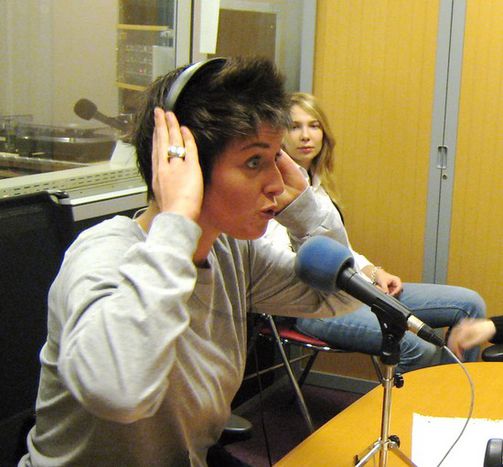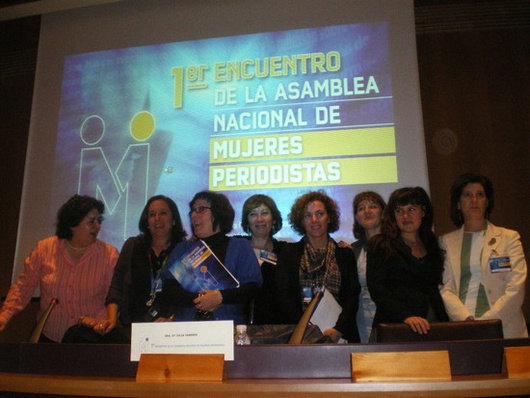
Erasmus for journalists, European elections for bores
Published on
Translation by:
Jessie L.European journalism comes face to face with the European elections: a lack of interest, problems and solutions discussed during a meeting of Spanish women journalists in Cadiz
‘A lack of European culture. If we as journalists aren't capable of putting a continental slant on our writing, it'll be impossible to create a European public opinion. They should design an Erasmus programme for journalists.’ These are the words of Marosa Montañés Duato, president of the association of women journalists in the Mediterranean, based in Valencia. She emphasises the current lack of media interest in Spain when it comes to what happens in the rest of Europe.
During the first meeting of the national assembly of women journalists from the federation of Spanish journalists associations (FAPE in Spanish), which took place on 8 November in Cádiz, there was a feeling of pessimism toward the old continent. Marosa Montañés's view wasn't the only one that exuded a certain scepticism in light of the upcoming June 2009 European elections and the role the media plays in them. Paz Santana, of Canal Sur (a regional public television channel in Andalucia, Spain) explains that viewers will only be interested if the topics coming from Brussels are relevant to them. For example, bringing up issues such as the spillage of oil into the Strait of Gibraltar by British oil tankers will grab the attention of Andalucians, as it affects them directly.
What affects citizens
 ‘The solution would be for both Canal Sur and the public to prioritise, or at least, give more coverage to, European issues that directly affect citizens, even if they're not yet conscious of them,’ adds the journalist. Similarly, Ana Marín, who works for Canal Sur's Granada team, blames the media for not knowing how to properly publicise news, laws, treaties and the application of local legislation passed by the European parliament and commission. Ana believes that European journalism does exist but is ‘very distant and has no practical use.’ She also adds that the media only reminds us that big problems such as the olive groves in eastern Andalucia are ‘subsidised by Europe’.
‘The solution would be for both Canal Sur and the public to prioritise, or at least, give more coverage to, European issues that directly affect citizens, even if they're not yet conscious of them,’ adds the journalist. Similarly, Ana Marín, who works for Canal Sur's Granada team, blames the media for not knowing how to properly publicise news, laws, treaties and the application of local legislation passed by the European parliament and commission. Ana believes that European journalism does exist but is ‘very distant and has no practical use.’ She also adds that the media only reminds us that big problems such as the olive groves in eastern Andalucia are ‘subsidised by Europe’.
All of the journalists that cafebabel.com speaks to recognise the importance of a European public opinion, but they confirm that it takes up very little space in the media. This isn't the fault of journalists - it's largely down to the boards of directors of media corporations. All of them ‘suppose’ that the importance of the upcoming European elections will be stressed, but ‘less than it should be since it's still not well-known that Brussels is present even in the most remote town of the Alpujarra’ (a mountainous region of Granada, traditionally isolated from the outside).
European journalism disappoints
Montserrat Minobis i Puntetonet seems especially disappointed with European journalism. The Catalan journalist was part of the European network of women journalists founded in 1992, with the objective of creating a network of professional contacts to deal with controversial issues from a European perspective. Until it was subsidised by the EU, ‘it worked, but when it changed direction, it lost a lot,’ she says.
'The EU elections are not well planned'
Montserrat also belongs to the European institute of the Mediterranean in Barcelona, which attempts to bring together the two Mediterranean shores in issues of peace, conflict, duties and rights of very different cultures. She fiercely criticises the 2009 elections, saying ‘they are not well planned. The closed lists don't allow us to get to know our representatives in the EU; so you only get the gist of it, without going into more detail, and this spreads throughout the media and to voters.’
Perhaps it's a question of time and priorities. In the first meeting of the assembly of women journalists from FAPE, various issues were examined, such as the portrayal of women in the media, the pay gap that still exists between professional men and women in Spain and the fact that women executives outnumber women writers by 60% in audiovisual media. This battle is still being fought in Spain - perhaps a European voice will be the next step towards winning it.
Translated from Una Erasmus para el periodismo europeo



